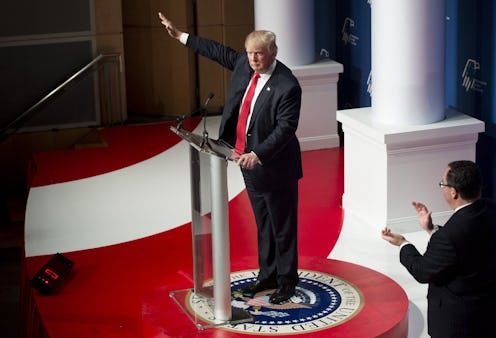News
This Is Why Donald Trump Is Dangerous
Republican presidential candidate Donald Trump announced on Monday that he believes the United States should enact a "total and complete shutdown of Muslims entering the United States until our country's representatives can figure out what is going on." Ted Cruz's proposed ban on immigration from countries with "territory substantially controlled by a foreign terrorist organization" sounds almost quaintly tame by comparison, doesn't it? Trump's shockingly Islamophobic comments sparked instant backlash, including from members of the Republican party, who appear to be growing increasingly tired of the Republican front-runner.
Trump's supporters may ardently support him, but the antipathy of many voters should be transitioning into active rage, because Trump's speech isn't just hateful. At this point, many of his followers are taking his xenophobic lead. With 55 percent of Americans viewing Muslims unfavorably in a March poll, hearing a major political candidate condemn the Muslim community could be contributing to the recent increase in attacks on Muslim communities, like feces and a mutilated Qu'ran being thrown at a Texas mosque; numerous instances of harassment against Muslim students; a proposed rally of white supremacists at a mosque; assaults on shop owners; and much, much more.
Trump has distinguished himself throughout the campaign thus far as marching more or less to the beat of his own drum, without the sanction or support of the GOP — in fact, he's threatened to go independent, claiming that he could take a chunk of the electorate with him. As his campaign progresses, he's becoming more and more frightening, illustrating for anyone who was in doubt that racism is alive and well on U.S. soil, and it's making a bid for the White House.
Monday's comments and the subsequent defense of same, however, go above and beyond the line from his usual hate speech and into something more troubling. Is he contributing to the vicious backlash that Muslims say is even worse than the Islamophobic aggression following 9/11? Muslims claim that he is — Dawud Walid, speaking for the Council on American-Islamic Relations in Michigan, said: "He's a man whose rhetoric incites hatred and he himself even condones street mob mentality." And from the other side, white supremacists have praised Trump for sparking "an insurgency" with his rhetoric.
In recent weeks, we've seen Liberty University chancellor Jerry Falwell Jr. at tell students to "end those Muslims." An attendee at a Trump rally in Massachusetts claimed to hear people around him threatening to kill Muslims and talking about "wanting to shoot someone."
He's radicalizing Americans, and raises a legitimate fear that hate speech and verbal attacks could escalate into something more physical.
The line he is crossing is one that should terrify all Americans, because aside from being deeply offensive, hateful, and un-American, it's also posing high risks to the Muslims who live and work in American society. As the rest of the world struggles to understand the American approach to free speech in contrast with their own bans on hate speech, we are grappling with an illustration of why some nations have curbs on free speech to specifically address situations like these. The thought of giving up First Amendment rights to push back on people like Trump might be troubling, but it's rhetoric like his that whipped up sentiment against other marginalized groups in the past, sometimes with grave consequences — though I loathe resorting to Godwin's Law, one of the reasons Hitler was so successful was because he was a skilled orator convinced of the righteousness of what he was saying, and so were his followers.
Even the GOP thinks Trump has gone too far with his latest comments:
The White House also took the somewhat unusual step of commenting on an active political campaign, with Press Secretary Josh Earnest saying that his comments "disqualified" him from the office of the presidency. (Earnest also took the time to make a deliciously snarky comment about Trump's hair, which puts him very close to C.J. Cregg level of White House Press Secretary, and that's a tough bar to meet.)
This is a nation where major news organizations dox the family members of suspected mass killers on live television, in part because of rhetoric exactly like this, which positions Muslims as less than human. In recent weeks, we have seen Trump sound uncertain about whether internment of Japanese-Americans in the Second World War was a bad thing, suggesting that we might do the same, despite the fact that this infamous and horrific period in American history is one that we should be deeply ashamed of — and one that Congress only apologized for in 1988, more than 40 years after the fact.
The stance he, and other conservatives, take on refugees and the Muslim community can also be rightly compared to the refusal of desperate Jewish refugees at the start of the World War II. And now he thinks that Muslims don't belong in America, despite the fact that they are our doctors, our first responders, our soldiers, our firefighters, our teachers, our commercial pilots, our friends, our neighbors, our lovers...
The America Donald Trump wants to live in is one where Muslims are in imminent danger, rejected from their communities, and refused at our borders, living in fear of finding their mosques vandalized, being harassed at work and school, being screamed at on the street. He wants to live in a country where naked racism slyly disguised as policy reforms is considered a legitimate part of a political campaign.
He wants to live in a country where white supremacy is celebrated, rather than condemned, and that's not the kind of country I want to live in. It's not the kind of country you should want to live in either, for regardless of religion, political opinions, experience, cultural background, or personal beliefs, we should all be able to agree that people who are going about their daily business should not be harassed for the simple crime of being Muslim.
